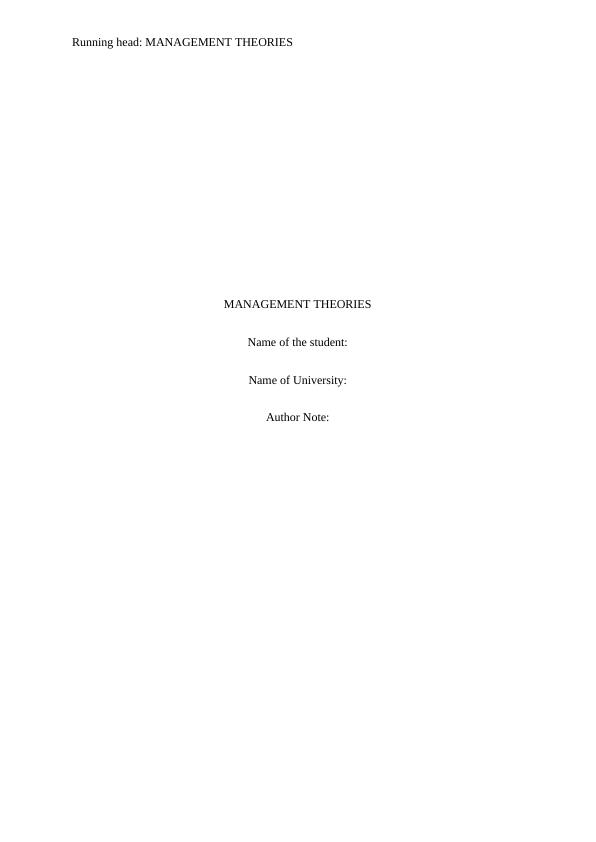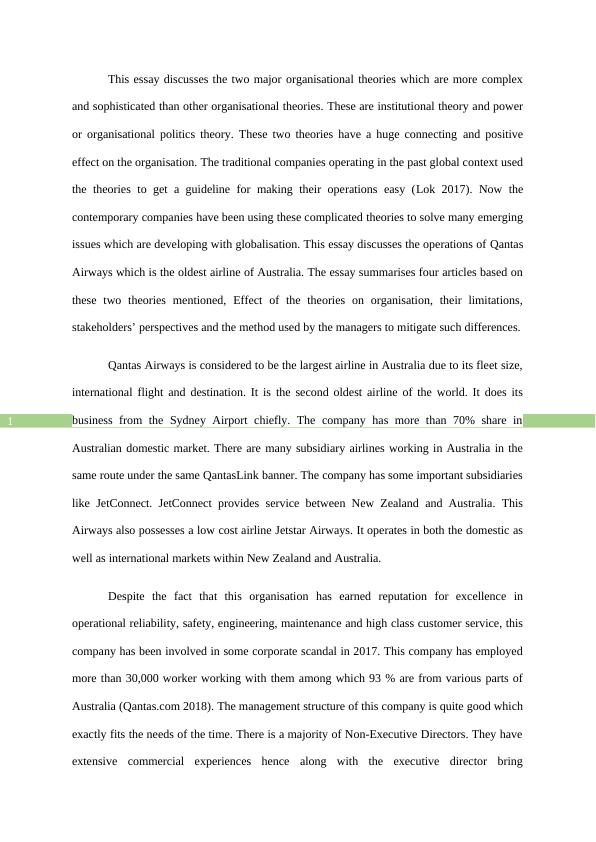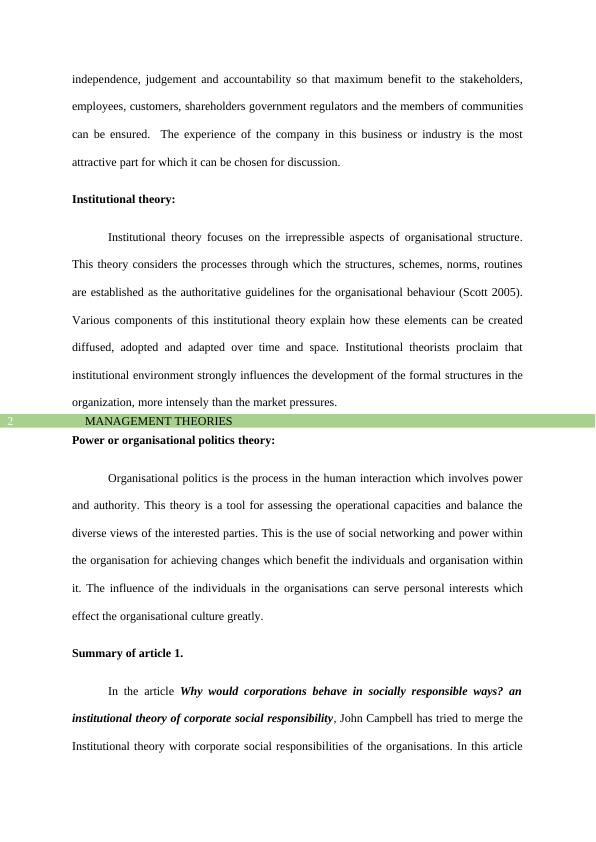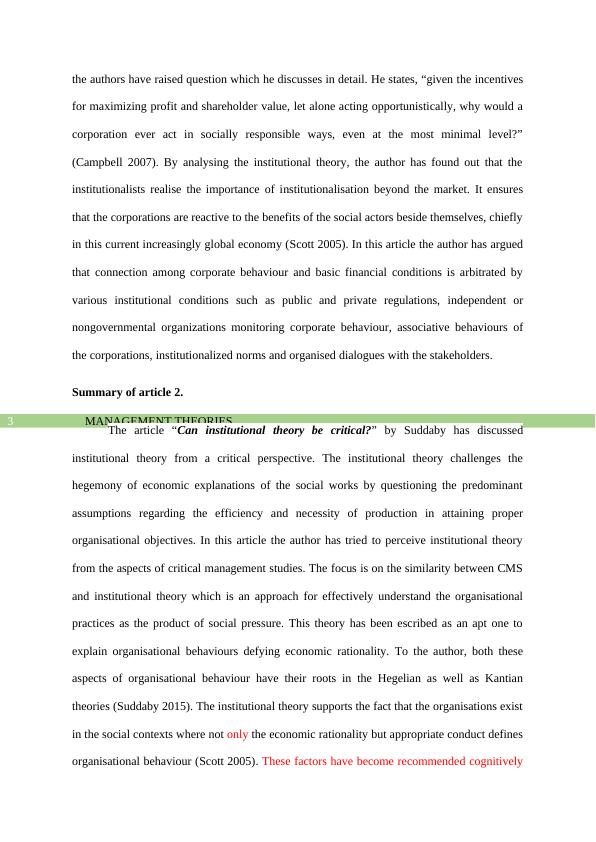Ask a question from expert
Management Theories and Practices (PDF)
12 Pages3293 Words250 Views
Added on 2021-05-31
Management Theories and Practices (PDF)
Added on 2021-05-31
BookmarkShareRelated Documents
Running head: MANAGEMENT THEORIESMANAGEMENT THEORIESName of the student:Name of University:Author Note:

MANAGEMENT THEORIES1This essay discusses the two major organisational theories which are more complexand sophisticated than other organisational theories. These are institutional theory and poweror organisational politics theory. These two theories have a huge connecting and positiveeffect on the organisation. The traditional companies operating in the past global context usedthe theories to get a guideline for making their operations easy (Lok 2017). Now thecontemporary companies have been using these complicated theories to solve many emergingissues which are developing with globalisation. This essay discusses the operations of QantasAirways which is the oldest airline of Australia. The essay summarises four articles based onthese two theories mentioned, Effect of the theories on organisation, their limitations,stakeholders’ perspectives and the method used by the managers to mitigate such differences.Qantas Airways is considered to be the largest airline in Australia due to its fleet size,international flight and destination. It is the second oldest airline of the world. It does itsbusiness from the Sydney Airport chiefly. The company has more than 70% share inAustralian domestic market. There are many subsidiary airlines working in Australia in thesame route under the same QantasLink banner. The company has some important subsidiarieslike JetConnect. JetConnect provides service between New Zealand and Australia. ThisAirways also possesses a low cost airline Jetstar Airways. It operates in both the domestic aswell as international markets within New Zealand and Australia. Despite the fact that this organisation has earned reputation for excellence inoperational reliability, safety, engineering, maintenance and high class customer service, thiscompany has been involved in some corporate scandal in 2017. This company has employedmore than 30,000 worker working with them among which 93 % are from various parts ofAustralia (Qantas.com 2018). The management structure of this company is quite good whichexactly fits the needs of the time. There is a majority of Non-Executive Directors. They haveextensive commercial experiences hence along with the executive director bring

MANAGEMENT THEORIES2independence, judgement and accountability so that maximum benefit to the stakeholders,employees, customers, shareholders government regulators and the members of communitiescan be ensured. The experience of the company in this business or industry is the mostattractive part for which it can be chosen for discussion. Institutional theory: Institutional theory focuses on the irrepressible aspects of organisational structure.This theory considers the processes through which the structures, schemes, norms, routinesare established as the authoritative guidelines for the organisational behaviour (Scott 2005).Various components of this institutional theory explain how these elements can be createddiffused, adopted and adapted over time and space. Institutional theorists proclaim thatinstitutional environment strongly influences the development of the formal structures in theorganization, more intensely than the market pressures. Power or organisational politics theory:Organisational politics is the process in the human interaction which involves powerand authority. This theory is a tool for assessing the operational capacities and balance thediverse views of the interested parties. This is the use of social networking and power withinthe organisation for achieving changes which benefit the individuals and organisation withinit. The influence of the individuals in the organisations can serve personal interests whicheffect the organisational culture greatly. Summary of article 1.In the article Why would corporations behave in socially responsible ways? aninstitutional theory of corporate social responsibility, John Campbell has tried to merge theInstitutional theory with corporate social responsibilities of the organisations. In this article

MANAGEMENT THEORIES3the authors have raised question which he discusses in detail. He states, “given the incentivesfor maximizing profit and shareholder value, let alone acting opportunistically, why would acorporation ever act in socially responsible ways, even at the most minimal level?”(Campbell 2007). By analysing the institutional theory, the author has found out that theinstitutionalists realise the importance of institutionalisation beyond the market. It ensuresthat the corporations are reactive to the benefits of the social actors beside themselves, chieflyin this current increasingly global economy (Scott 2005). In this article the author has arguedthat connection among corporate behaviour and basic financial conditions is arbitrated byvarious institutional conditions such as public and private regulations, independent ornongovernmental organizations monitoring corporate behaviour, associative behaviours ofthe corporations, institutionalized norms and organised dialogues with the stakeholders.Summary of article 2. The article “Can institutional theory be critical?” by Suddaby has discussedinstitutional theory from a critical perspective. The institutional theory challenges thehegemony of economic explanations of the social works by questioning the predominantassumptions regarding the efficiency and necessity of production in attaining properorganisational objectives. In this article the author has tried to perceive institutional theoryfrom the aspects of critical management studies. The focus is on the similarity between CMSand institutional theory which is an approach for effectively understand the organisationalpractices as the product of social pressure. This theory has been escribed as an apt one toexplain organisational behaviours defying economic rationality. To the author, both theseaspects of organisational behaviour have their roots in the Hegelian as well as Kantiantheories (Suddaby 2015). The institutional theory supports the fact that the organisations existin the social contexts where not only the economic rationality but appropriate conduct definesorganisational behaviour (Scott 2005). These factors have become recommended cognitively

End of preview
Want to access all the pages? Upload your documents or become a member.
Related Documents
Organisational Structure and Effectiveness in Qantas Airlineslg...
|9
|2827
|287
Organisational Structure - Assignmentlg...
|10
|2811
|238
(Doc) Cross-Cultural Management Assignment Solutionlg...
|11
|3014
|72
Organisational structure and effectiveness Assignmentlg...
|8
|2920
|22
MBS539 – Accounting for Managerslg...
|7
|1509
|60
Strategic Analysis of qantas airlines PDFlg...
|12
|2867
|98